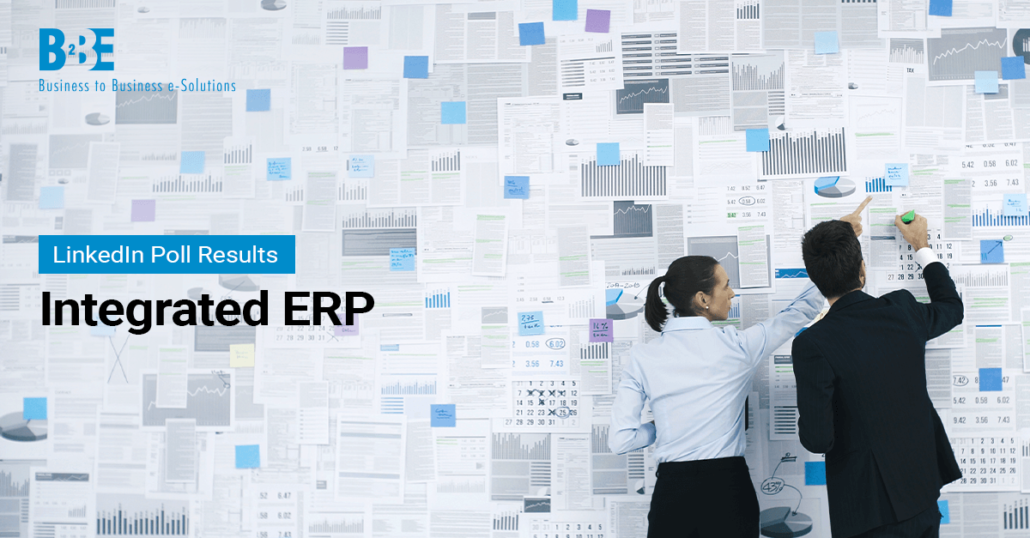In this article, we outline 4 key features to look for when selecting an integrated ERP solution for your business.
The role of Enterprise Resource Planning (ERP) solutions has evolved from mere data management systems to strategic enablers of growth and efficiency. ERP systems have emerged as indispensable tools, integrating various business processes and functions into a single unified platform. These business functions include finance, human resources, supply chain management, manufacturing, and more. This also provides businesses with plenty of real-time visibility, data-driven insights, and decision-making capabilities. As customer expectations continue to evolve, so too does the demand for ERP solutions that can adapt and meet the ever-changing needs of modern businesses.
Poll results
In our most recent LinkedIn poll, we asked our followers what they typically look for when it comes to an integrated ERP solution.
What to look for in an integrated ERP solution
When looking for an integrated ERP solution, it’s advisable to look for the following:
- Better customer management
- Improved data transmission
- Improved collaboration
- Automated processes
Better customer management
40% of respondents emphasized the significance of strong customer management capabilities. Naturally, the customer comes first when it comes to business. Therefore, businesses tend to look for resources and tools that focus on this aspect. Seamless customer relationship management (CRM) tools, integrated customer data repositories, and advanced data analytics are essential components that contribute to bringing a positive customer experience.
Modern integrated ERP solutions offer robust CRM functionalities, allowing businesses to manage customer interactions, track leads, and nurture relationships throughout the customer lifecycle. CRM modules within ERP systems enable businesses to capture and analyse customer data, create personalised marketing campaigns, and provide timely support and assistance. By centralising customer information and interactions, ERP-driven CRM tools therefore empower organisations to deliver seamless, personalised experiences across all touchpoints.
Visionnez notre vidéo ci-dessous :
Improved data transmission
A notable 20% of respondents stressed the need for efficient data transmission mechanisms in ERP solutions. Efficient data transmission enables stakeholders to access critical information in real time, empowering them to make informed decisions promptly. Whether it’s monitoring inventory levels, tracking sales orders, or analysing financial performance, ERP systems ensure that stakeholders have timely access to accurate data, facilitating agile responses to market dynamics and operational challenges.
Ensuring timely access to accurate information, integrated ERP platforms are expected to offer robust data transmission protocols, integration with third-party systems, and data synchronisation mechanisms to support informed decision-making and compliance with regulatory requirements.
Improved collaboration
20% of respondents emphasized the importance of enhanced collaboration capabilities within ERP solutions. Businesses are looking for platforms that facilitate seamless communication, document management, and project collaboration. The desired result of this would be achieving better innovation and agility across teams and departments.
Effective collaboration begins with clear and centralised communication channels that enable teams to connect, share ideas, and coordinate activities seamlessly. Modern ERP solutions offer integrated communication tools within a single unified platform. These include instant messaging, video conferencing, and discussion forums. By providing a centralised hub for communication, ERP-driven collaboration platforms encourage real-time interactions, reduce email clutter, and build a culture of transparency and openness across the company.
Automated processes
Finally, 20% of respondents voted for the value of streamlined workflows and reduced manual intervention. Modern ERP solutions are expected to incorporate automation features such as workflow automation, IoT integration, and machine learning algorithms to boost efficiency and minimise errors.
Workflow automation is at the heart of modern ERP solutions. It enables businesses to automate repetitive tasks, standardise processes, and streamline operations. ERP systems offer workflow automation tools that allow businesses to define, execute, and monitor workflows across various departments and functions. Whether it’s processing purchase orders, approving expense reports, or managing inventory replenishment, workflow automation ensures consistency, efficiency, and compliance with policies and procedures.
Learn more about B2BE’s integrated ERP solutions.
More information
B2BE’s experience in the supply chain sector allows our customers to build, expand and adapt successfully, enabling greater effectiveness. To engage with B2BE and offer feedback on what matters most to you and your business, make sure to follow us on LinkedIn and across social media. You can also vote in our latest LinkedIn poll. If you’d like to discuss your supply chain strategy, get in touch with us.

